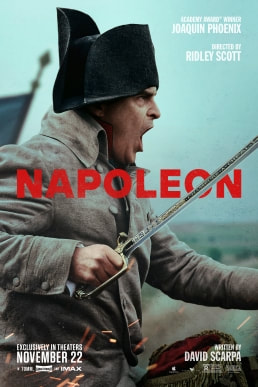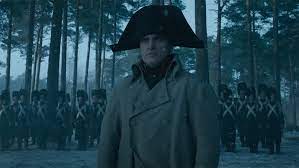|
“Napoleon” stars Joaquin Phoenix, Vanessa Kirby, Tahar Rahim, Ben Miles, and Rupert Everett. Released on November 22, 2023, the film chronicles Napoleon Bonaparte and his rise to power. The film was directed by Ridley Scott, who also directed films such as “Blade Runner,” “Gladiator,” “American Gangster,” “The Last Duel,” and “House of Gucci.” Many figures throughout history seek to rule a country for several reasons. Some do it to help their people live better lives, while others do it for power, greed, and themselves. For the latter, none of these rulers were more ruthless and determined to conquer the lands than the French leader himself, Napoleon Bonaparte. Napoleon may be well-known for being one of the greatest military commanders in history, but he’s also not without his controversial choices that made him a tyrant. What better way to explore this side of Bonaparte than through the eyes of Ridley Scott, who’s no stranger to providing epic historical dramas? Nothing wrong with gaining some historical knowledge during the holidays, if I do say so myself. So, does it offer a thrilling depiction of one of France’s infamous rulers, or does it deserve to be shamed along with the titular commander? Let’s find out. The movie follows the life of Napoleon Bonaparte (Phoenix), an army officer seeking to conquer France. Amid his battles, Napoleon goes through many accomplishments outside the battlefield, including marrying Joséphine de Beauharnais (Kirby), an aristocratic widow, and being crowned Emperor of the French. As his quest for power develops throughout the years, Napoleon faces complicated challenges that could damper his chances at success, including his toxic relationship with Joséphine. Considering my appreciation for some of Ridley Scott’s works, I was surprised that I was one of several people late to Bonaparte’s bloody party. Obviously, it was due to me getting ready for the holidays, and I was a bit swamped with other movies that caught my attention. It’s a small price to pay for being a responsible adult with a career in reviewing films. Fortunately, I was able to make time to check out Scott’s latest historical drama before we head into the final busy weeks of 2023. This film was on my watch list because of Ridley Scott, despite his recent works being hit-and-miss, and even Joaquin Phoenix, who’s hoping to join the awards race again this year following his Oscar win for “Joker”. These two people seemed like a promising combination to properly envision the French officer’s rise to power in cinematic form. Unfortunately, even with its star power, the film struggles to deliver a historical lesson as ruthless and powerful as its titular figure. The narrative in “Napoleon” consists of a series of events depicting Bonaparte’s obsession with power through his battles and relationship with Joséphine. His desire resulted in Napoleon realizing he’s gone over his head. If you’ve read about his history at school or college, you’d know exactly how his reign ended, and you’d probably like the film for bringing these historical events to life on the big screen. However, if you’re hoping for an accurate depiction of Napoleon’s rise and downfall, you might be disappointed with the final result. It plays off like the other biopics of years past, in which they took inspiration from their real-life events to craft traditional Hollywoodized stories instead of depicting them accurately. I was aware of this before watching the film, but I shrugged it off because I knew it had happened many times before. Understandably, its inaccuracies harm the film’s chances of exceeding its traditional biopic standards and impressing the French. However, what matters most is the story’s execution and whether it’s engaging enough to match its immersive scale. After experiencing the movie, I can finally say that it’s as epic as I anticipated, but its middling screenplay struggles to reach that same height as its grimly gorgeous presentation. This is writer David Scarpa’s second collaboration with Ridley Scott, following 2017’s “All the Money in the World”, which I thought was superb. Scarpa’s script for “Napoleon” has some promising moments that could’ve made for another fantastic character study of a person’s desire to rule, along with a few unexpected chuckles. Sadly, those moments lack the proper oomph in its narrative and dialogue to keep its army alive in enemy territory. It’s not boring, as it relies on its cast and technical aspects to keep me awake. It’s that the story lacks the emotional impact of its dialogue-driven sequences and themes to make the film as attention-grabbing as Napoleon’s victorious battles. It also doesn’t help that it’s plagued by its uneven pacing. Even with the film’s two-and-a-half-hour runtime, it felt like it left out something important for its character growth and made specific scenes drag out a bit too long for me. It definitely has several sequences that could work well in its favor, but they surprisingly don’t click for me. Let’s hope Scarpa can redeem himself with his screenplay for Scott’s “Gladiator” sequel. Thankfully, Ridley Scott still hasn’t lost his touch in envisioning world history on an epic and gratifying scale. What “Napoleon” lacks in character and powerful storytelling easily compensates with its presentation and Scott’s direction. In case you aren’t familiar with his works, Scott has a profound way of bringing even the most devastating parts of history to life. He even doesn’t shy away from showcasing the grotesque realism of historical violence and sex. It’s one of the reasons why I adored “The Last Duel”. “Napoleon” is unsurprisingly no different, with his visionary skills portraying its brilliant battle sequences and the blood they left behind. These scenes make the reenactments from actors in a historical-based park look like elementary school plays. The Battle of Austerlitz is my best example of how superb the film’s action scenes were. Regarding Dariusz Wolski’s stellar cinematography and the editing by Claire Simpson and Sam Restivo, that scene perfectly portrays the unsettling horror of Napoleon’s clever mind, especially when his enemies drown in the frozen lakes. I will also credit the film for its immersive set designs and costumes, as they’re some of the things that are more accurate than its depiction. Along with the technical aspects envisioned by Scott, the film also compensates for its shortcomings with its cast. While I wouldn’t call some of their performances Oscar-worthy, the actors still provide enough gravitas in their characters to help them have a fighting chance. Joaquin Phoenix was suitably captivating as the infamous army officer seeking power, which is enough to bypass some of his sluggish scenes. It’s not the best performance I’ve seen from the award-winning actor, but what he brought to the subtly demanding and heartless character convinced me to look forward to his future projects. Vanessa Kirby also did a solid job with her performance as Joséphine, Napoleon’s wife who’s as internally complex as her fiancee. Tahar Rahim and Rupert Everett were also decent as Paul Barras and Arthur Wellesley, respectively. Overall, “Napoleon” doesn’t rank as high in Hollywood’s list of historical epics as I anticipated, but the grandness in its presentation helped it survive most of its onslaught. It’s not without a few moments relying on Ridley Scott’s filmmaking strengths, and Phoenix continues to prove himself as an actor worth watching regarding his performance. Unfortunately, they’re not enough to truly honor the accomplishments set by the power-hungry ruler due to its middling script, historical inaccuracies, and uneven pacing. It’s not the worst film I’ve seen from Ridley Scott, but I wouldn’t call it historic like some of his other classics. It’s worth checking out if you’re a fan of the people involved. But if you don’t like lengthy historical dramas, you might want to wait for the film to arrive on Apple TV+. C+
0 Comments
Leave a Reply. |
Home of the most friendly movie reviews on the planet.
Categories
All
Follow Me |
- Home
- Classic Reviews
- 2015 Reviews
- 2016 Reviews
- 2017 Reviews
- 2018 Reviews
- 2019 Reviews
- 2020 Reviews
- 2021 Reviews
- 2022 Reviews
- 2023 Reviews
- 2024 Reviews
- Movie Talk
-
Fan Fictions
-
Ed, Edd n Eddy: The Ultimate Ed-Chronicles
>
-
The 'Beginnings' Saga
>
- Ed, Edd n Eddy: The Rise of Maleficent >
- Transformers: Legend of the Black Cauldron >
- Ed, Edd n Eddy meets the Penguins of Madagascar >
- The Eds and Iron Man: Dawn of the Blowhole >
- Ed, Edd n Eddy: The Fast and the Furious >
- The Eds and Kung Fu Panda: Battle for China >
- Ed, Edd n Eddy and the Lion King: The Full Circle >
- Ed, Edd n Eddy meets Thumbelina: Revenge of the Shredder >
- Ed, Edd n Eddy: Journey to Neverland >
- Ed, Edd n Eddy: All Tangled Up >
- Ed, Edd n Eddy's Frozen Adventure >
- Ed, Edd n Eddy's Edventures in San Fransokyo
- Ed, Edd n Eddy: Return to Neverland
- Ed, Edd n Eddy vs The League of Evil
-
The 'Avengers' Saga
>
- The Eds and the Little Mermaid: Age of Extinction
- Ed, Edd n Eddy meets the Ghostbusters
- Ed, Edd n Eddy: A Sea of Adventure
- Ed, Edd n Eddy meets Anastasia
- Ed, Edd n Eddy in Who Framed Roger Rabbit?
- Ed, Edd n Eddy meets the Incredibles
- Ed, Edd n Eddy and the Lion King 2: Simba's Pride
- Ed, Edd n Eddy: Brand New Zootopia
- Ed, Edd n Eddy: Into the Sugar Rush
- Ed, Edd n Eddy and the Big Sea Quest
- Ed, Edd n Eddy: Heroes Assemble
- Fastformers: Rio Heist
- The Loud Ghostbusters >
-
The 'Beginnings' Saga
>
-
Ed, Edd n Eddy: The Ultimate Ed-Chronicles
>
- Contact
- About


